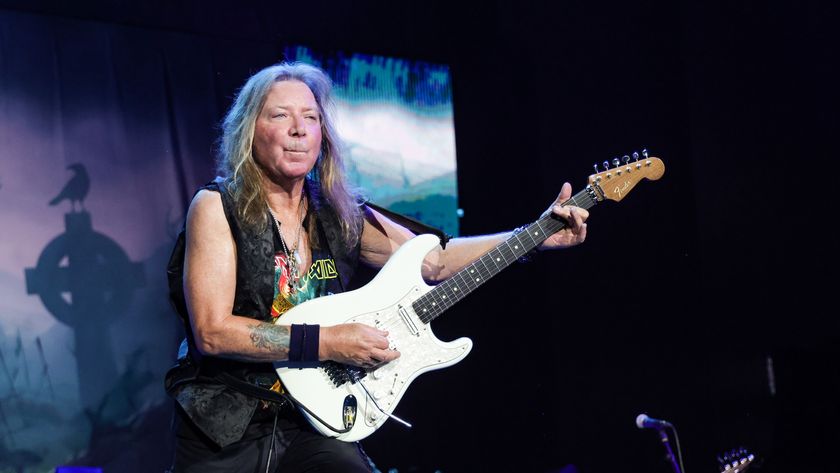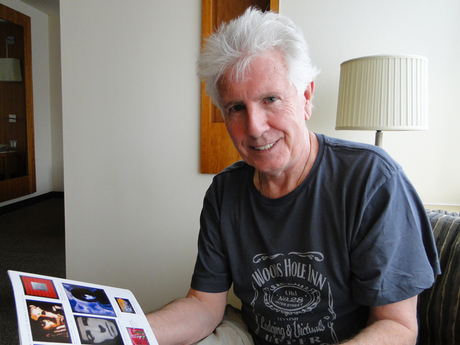
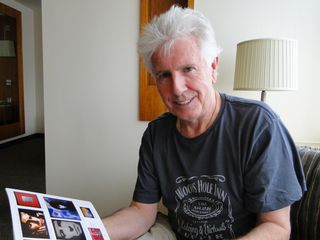
Graham Nash, photographed on 23 July 2012 at Le Parker Meridian Hotel, New York City. © Joe Bosso
It's a beautiful, warm summer day in New York City, and Graham Nash relaxes in his spacious suite at Le Parker Meridian Hotel, sipping a jumbo-sized Jamba Juice and enthusing about the current Crosby, Stills & Nash tour.
"Something very exciting is happening," he says. "We're singing and playing so well. There's a certain kind of spark between the three of us, and it's really hot right now. We feel it, the audience feels it - it's a great time."
Coinciding with the tour - or commemorating it, in a way - is the just released CSN 2012, a lavish DVD/Blu-ray set filmed last April at The Performing Arts Center in San Luis Obispo, California, that captures the band performing over two dozen of their classic hits. "You can see and hear just how good we're playing on the DVD," Nash says. "I'm really enjoying this tour, and the response we're getting... I don't know, it's like something's in the air. People really love what we're doing."
Spry and fit and looking nowhere near his 70 years, Nash has a lot on his plate these days: In addition to the tour, he's had his first-ever art exhibit, The Art Of Graham Nash, that opened recently at Ocean Galleries in Stone Harbor, New Jersey. What's more, he's just signed a seven-figure deal with Random House's Crown Archetype to pen his memoir, due in late 2013.
With a nearly 50-year career in music, the two-time Rock And Roll Hall Of Fame inductee (as a member of The Hollies and Crosby, Stills & Nash) should have no problem filling a book with vivid stories, and during an extensive interview with MusicRadar - so comprehensive that we're presenting it in two parts - he gave what could be described as a generous preview, discussing drug use (his own and David Crosby's); CSN's recent, failed attempt at recording with famed producer Rick Rubin; his love of Buddy Holly; '60s pop stardom; and how he came to leave his band The Hollies to hook up members of The Byrds (Crosby) and Buffalo Springfield (Stephen Stills) to form one of the greatest musical ensembles of all-time.
You've just signed a million-dollar book deal, so why are we doing an interview? Shouldn't you be saving all your stories?
Get the MusicRadar Newsletter
Want all the hottest music and gear news, reviews, deals, features and more, direct to your inbox? Sign up here.
[laughs] "There's a million things that have happened to me in my life. Believe me, I've no shortage of stories."
But that brings up something interesting: Throughout your career, it seems as though you've been surrounded by people who have OD'd, been to rehab, hung girls from hotel balconies and all that. You've been the tame one - the observer to the madness.
"Well… it's like with Crosby. You know, when he was so down, when he was so lost, I tried taking more drugs than David. Seriously. And I tried taking no drugs. I tried everything with David, and then I realized that only he could help himself. But I've done everything that you've said - girls off balconies, I've done all that. I've never been in rehab and I've never been an addict. I've taken as many drugs as my partners, but I've never done it to the point where I was out of control. It's not that I'm a control freak, I just want to live a good life."
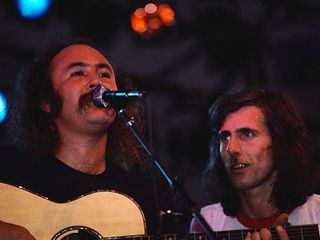
Of singer David Crosby, Nash says, "He saved my ass." © Lynn Goldsmith/Corbis
Somehow, you had the filter that made you know when to stop.
"You have to understand, I'd been in a successful rock 'n' roll band before I even met David Crosby, Stephen Stills and Neil Young. I'd already been there, done this, done that - it's not that important. I understand what it is. I understand what fans are, what fame is, you know?"
When David was at his lowest… I remember a Spin magazine piece that came out in the mid-'80s that was pretty horrifying -
"I do, too. Brutal."
That he was so low was news to a lot of people at the time.
"Not to me, though."
As a bandmate and, more importantly, a friend, how do you get through that?
"You have to have faith. I never thought that Crosby would die because of drugs. I knew that he was out there on the edge, I knew all that, but I never thought that he would physically die. I had faith that the universe would take care of him through all his madness, and I was there to love him and take care of him. In a way, I was paying him back because he saved my ass when I was in the Hollies, when I was writing Marrakesh Express and Teach Your Children and Right Between The Eyes, and they were like, 'No, no, no, no.' Crosby came up to me and said, 'Those songs are really good. Don't let them make you think otherwise.' So yeah, I was paying him back."
Several weeks ago, I spoke with Stephen Stills -
[smiles] "I noticed."
He told me at the time that Crosby, Stills & Nash "won't make another album, we won't finish one." What is your take on that?
[laughs] "Two things are happening. One: Stephen doesn't know the big picture. And two: Stephen is very deaf. He may have misheard you, or he may have been answering the question he thought you asked. Crosby, Stills & Nash will do another record. We're right in the middle of one, Songs We Wish We'd Written. We started that process with Rick Rubin. It didn't work out, but the idea is still a brilliant one."
"We took the songs we did with Rick, put them on the shelf, and we rerecorded them. We've already done Close Your Eyes, Behind Blue Eyes, Ruby Tuesday and a couple more. We're in the middle of it, as I said. It's going to be difficult right now because we're on tour until October. As you can imagine, it's hard to get three people into the studio, especially if they're doing different things and have different schedules. So it comes off that Stephen thinks there'll be no new recordings, which couldn't be further from the truth."
What was the problem with working with Rick Rubin? Why did you guys part ways with him so quickly?
"After almost 50 years of making records, we think we know what we're doing, so it's very hard to tell Crosby, Stills & Nash what to do. You can suggest anything you want, but you can't tell us what to do. We were recording at Shangri La in Malibu and… it was not a great experience. First of all, he pissed off David Crosby. David said that we wanted to do Blackbird and another Beatles song. Rick said, 'There will only be one Beatles song.' Crosby said to him, 'There'll only be one Beatles song if we decide there will be one Beatles song.' You know, like, 'Who the fuck are you to tell me…' From the start, it was irritable.
"Crosby wasn't into it, and when Crosby's not into something, it's very difficult to pull it off. We kept trying and kept trying, but it didn't work. You can't tell us what to do. Rick is a brilliant man, but we just rubbed each other the wrong way."
You did record some things with him, though. Did they sound good to you?
"Spiritually, it's gotta be there, and if we're not into it, there's no spirit. And you can hear it. Where's the heart? It wasn't there. We felt like we had this guy who was telling us what to do all the time. I mean, who the fuck is Rick Rubin? I know he's sold millions of records, but who the fuck is he to tell Crosby, Stills & Nash what to do? Guide us - yes. Make suggestions - fantastic. 'Try it this way' - no problem. But don't tell us what to do. You can't."
Let's talk about Buddy Holly. [Nash smiles] This little band you were in took their name from him. How important was Buddy Holly to you when you were coming up?
"Buddy Holly was one of us. He wasn't Elvis Presley, he wasn't James Dean, he didn't have slicked-back hair, he didn't swivel his hips. He was one of us, a fucking nerd with glasses. I remember standing with Allan Clarke [from The Hollies] on that day in February of '59, having just heard that Buddy had been killed, and we were in tears.
"He meant a great deal to us. That's why 50 years to the day, I played the Surf Ballroom in Clear Lake, Iowa, which is where he played his last concert. I went to the spot where his plane crashed. Intensely sad."
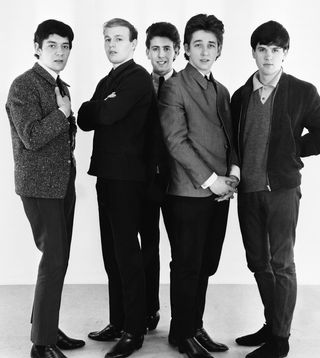
Nash (center) with The Hollies, 1964. "It was an insane time," he says. © Hulton-Deutsch Collection/CORBIS
A couple of years ago, you got to play Buddy's guitar, his leather-bound Gibson J-45.
"Not only that, but I got to sing with him. The film Peggy Sue Got Married was directed by a friend of mine [Francis Ford Coppola], who said that he'd gotten permission to use a song called Peggy Sue Got Married, which was recorded right here in New York City, in Buddy's apartment on a small Grundig tape recorder. It was just Buddy and an acoustic. So I said, 'Why don't we put the two-track to a multi-track. We'll get Paul on bass, Phil Collins on drums, George on guitar, and we'll make a track out of the original?'
"For some reason, it didn't work out. But The Hollies did that. We made a track of it and did it for a tribute record called Not Fade Away. So I got to sing with Buddy. And I did get to play his guitar and sing Peggy Sue, which was amazing!" [laughs]
What was it like singing along to Buddy Holly, hearing your voice with his?
"Unbelievable. It would be like singing with Elvis. You know, I'm still a fan."
And playing his guitar...
"Incredible. It was phenomenal. There's a video of me playing Peggy Sue on that guitar. It was insane, because I'm a fan. I think all fans want to get as close to the flame as possible. So when you're playing Buddy's guitar, which he may have written Peggy Sue on, how much closer, other than him physically being there, could you be? We're all trying to touch that flame."
Because you're not a flashy player, do you feel as though you don't get as much recognition on the guitar as the people you've played with?
"I don't care about any of that. I don't. I'm not Stephen Stills, and I'm not Neil Young, and I'm not David Crosby. But I am me, and I play decent rhythm guitar. I play well enough in order to support myself in terms of songwriting and doing acoustic concerts and all that. I don't care what people think about my musical abilities - I really don't. I'm doing what I do, and if you like it, great, and if you don't, fuck off." [laughs]
In their early days, John Lennon, Paul McCartney and George Harrison would sit together and work on their vocal harmonies. Did The Hollies do the same thing?
"Absolutely. That's what we did. But it was mainly based on me and Allan. We'd been singing together since we were six. We did school shows and all kinds of things, so we always knew we could sing together. Allan's brother Frank came home one day and said, 'I go to this working men's club outside of Manchester. You two sing pretty good together. I'm going to see if I can get you on stage.'
"We'd never been on stage before. So we went to this club, we played two or three songs - we were just two 15-year-old kids with acoustic guitars - and we got paid 10 pounds! Now, my father would work all week for 18 pounds, and we got 10 pounds for two or three songs. It was like [rubs his chin], 'Hmmm, how interesting this is!' So we built up on that, worked up the two-part harmonies, and then when Tony [Hicks] came in we did the three-part.
"But you know, we were just kids from Manchester who were supposed to do what our dads did. You're supposed to be in the mine: 'If it's good enough for your fucking grandfather, it's good enough for you. Get down and go work in the mill.' My mother and father would never let me do that."
You got to experience something very few people did, a phenomenon most people have only read about: You were a pop star in Britain in the 1960s. How freaking awesome was that?
"Well, in retrospect, it was awesome, but then it was the fact that we escaped from Manchester. We were happy to be in London. That's where you go if you want to be a musician: you go to London, and then you want to go to America."
But have we romanticized the halcyon days of British pop stardom, or was it really, truly crazy?
"No. It was an insane time. It was wild. Absolutely - in hindsight. Then, we were just escaping Manchester and getting to do what we wanted. And that's what we did."
Were The Hollies pretty competitive as songwriters?
"No. There wasn't competition. It was like, 'Shit, that verse… where does it go?' And then you'd say, 'Why don't we do this?' Competition? No."
In '66, you met David and Stephen in the US. Was there something in your head that said, "Hmm, we could sing well together, too?"
"It was a collusion of a few things. One: I was writing what I thought were decent songs that The Hollies were ignoring. Two: They wanted to do an album of Bob Dylan songs in a Las Vegas kind of style, and I didn't want to do that, although I did Blowin' In The Wind, which pisses me off to this day. And three: Crosby was there to tell me that my songs were pretty decent.
"I flew in from London to Los Angeles to have dinner with Joni Mitchell. That's when we first sang together, in Joni's living room. Whatever sound Crosby, Stills & Nash have was born in a minute. We didn't have to rehearse, we didn't have to slog through - it happened in a minute.
"After that minute of hearing the three of us sing together, I realized a couple of things. One: that I would have to leave my band, because this was way more exciting than having people put you down all the time. And secondly, that I would have to leave England and come to Los Angeles to sing with David and Stephen."
Joe is a freelance journalist who has, over the past few decades, interviewed hundreds of guitarists for Guitar World, Guitar Player, MusicRadar and Classic Rock. He is also a former editor of Guitar World, contributing writer for Guitar Aficionado and VP of A&R for Island Records. He’s an enthusiastic guitarist, but he’s nowhere near the likes of the people he interviews. Surprisingly, his skills are more suited to the drums. If you need a drummer for your Beatles tribute band, look him up.
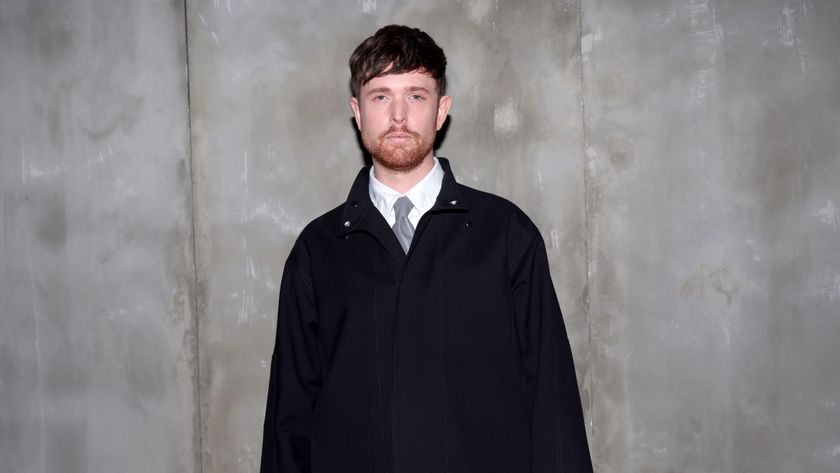
"I was having regular panic attacks about not being in control and being exploited": James Blake on how ditching his label and going independent has revitalized his career
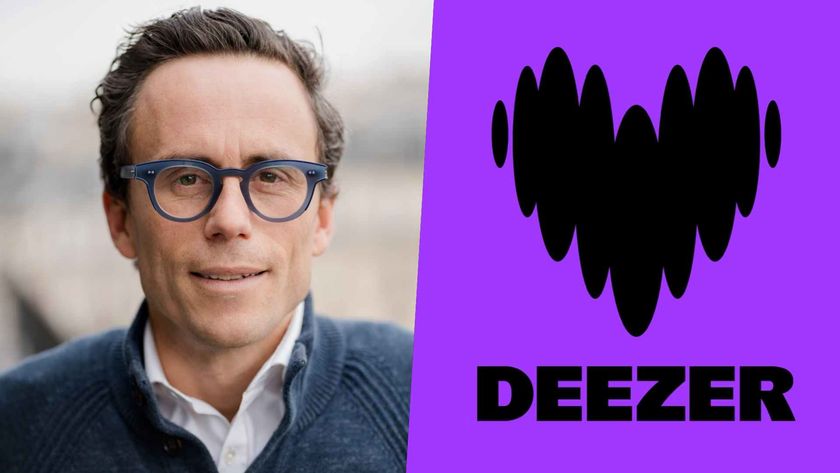
“We want your subscription to go to the artist you listen to. Nobody can fraud that”: Deezer's CEO takes on streaming giants with fairer royalties for artists
Most Popular








